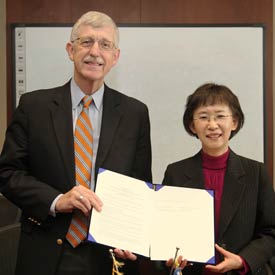New partnership models emerge for research training
January / February 2013 | Volume 12, Issue 1

Photo by Jeff Gray/Fogarty
For the first time, South Korea will fund 12 post-doctoral
trainees at the NIH. Above, NIH Director Dr. Francis S.
Collins and Korean official Dr. Kyung-Hwa Ko, hold the
signed agreement.
New models of research training partnerships are emerging in the global health arena, reflecting the increased ability and desire of middle-income countries to expand their research capacity and develop international scientific partnerships. Authorities in China and South Korea recently made pacts with entities in the U.S. to support research training and joint projects.
South Korea's Health Industry Development Institute announced it will support the Korean Visiting Scientist Training Award to train Korean postdoctoral-level scientists at the NIH where they will benefit from the large pool of experts and high-tech equipment. Training will initially focus on six areas of interest: cancer, neuroscience, cardiovascular conditions, metabolic processes, allergy and chronic disease, and reproductive health. Korea will contribute $1.4 million over two years.
Meanwhile, the Fudan Institute of Global Health in China and Duke University's Global Health Institute in North Carolina have pledged to facilitate undergraduate and graduate student exchanges and research projects between their institutions. They will also jointly support interdisciplinary research in Asia and Africa, strengthening South-South partnerships and leveraging research funding opportunities for important health fields such as non-communicable diseases.
An agreement also has been forged between Peking University Health Science Center and the University of Michigan Health System. The two universities jointly committed $14 million to fund collaborative research projects and education focusing on three pervasive medical conditions: pulmonary, cardiovascular and liver diseases.
"We are seeing more governments interested in stepping up the capacity for scientific research in their country by advancing funds for the quality training of scientists at collaborating institutions in the U.S.," said Fogarty Director Dr. Roger I. Glass. "I am hopeful that these types of arrangements will multiply, allowing researchers to expand and deepen international partnerships that will improve the health outlook for populations everywhere."
More Information
To view Adobe PDF files,
download current, free accessible plug-ins from Adobe's website.